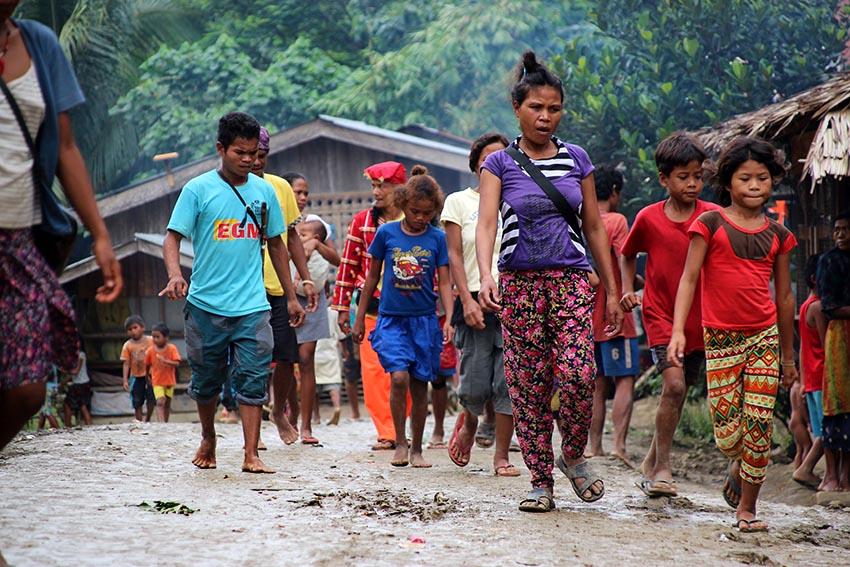
SITIO TIBUCAG, TALAINGOD. Manobo residents of Sitio Tibucag, Barangay Dagohoy in Talaingod, Davao del Norte gathering for an early morning ritual on Nov. 30, Wednesday. Many of the residents are evacuees at the United Church of Christ in the Philippines Haran compound in Davao City who fled the community because of militarization and threats from paramilitary group Alamara. (Paulo C. Rizal/davaotoday.com)
DAVAO CITY, Philippines – A few months after returning to their communities from evacuation the Ata-Manobos who have returned to their communities in Talaingod, Davao Del Norte province are rebuilding their homes and way of life.
However, when they returned from evacuation, the Lumad suffer hunger and a strain of sickness as well.
The Manobos of Talaingod fled their communities in April 2014 after experiencing harassment from the military and the paramilitary group Alamara.
Datu Gumbel Mansimuy-at, who heads the agriculture committee of Salugpongan Ta Tanu Igkanogon, said that their farms were completely neglected since 2014 when they evacuated to Davao City. While not everyone joined the mass evacuation, those who remained behind could not tend to their farms for fear of their lives, he said.
However, Datu Gumbel said it may take them five to six months before they can be economically independent again. Their community practices communal farming, wherein a whole Sitio helps in tending a farm. The community plants root crops, corn and rice. Half of the produce will be shared among their members for consumption, while the other half will be sold, Datu Gumbel said.
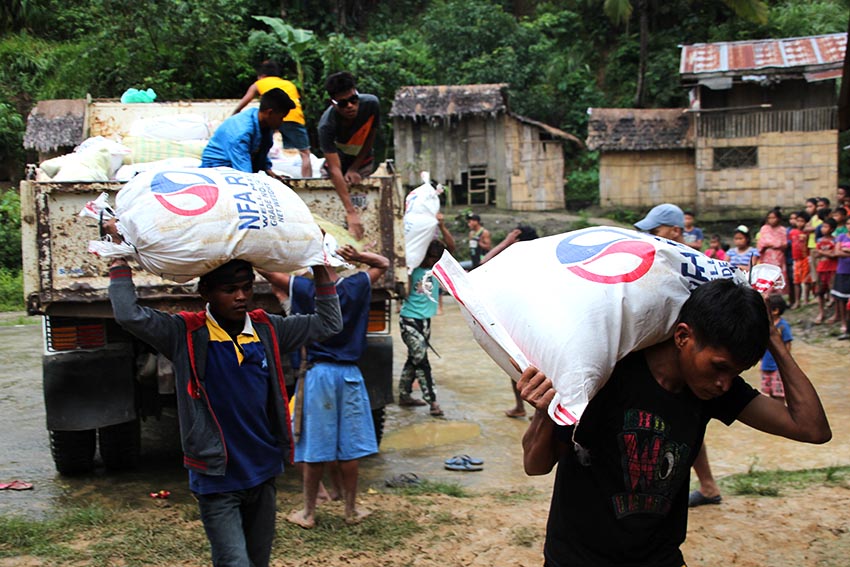
TEMPORARY RELIEF. Manobo residents of Sitio Tibucag, Barangay Dagohoy in Talaingod, Davao Del Norte receive relief packs from the Solidarity Action Group for Indigenous Peoples and Peasants and the Department of Social Welfare and Development. Each family received six kilos of rice and canned goods. (Paulo C. Rizal/davaotoday.com)
Apart from relief packs, the residents also received sacks of rice paddy to kick-start their farming.

FREE CHECKUP. A health worker checks a Manobo child in a day care center in Sitio Tibucag, Brgy. Dagohoy, Davao Del Norte during a relief mission organized by the Solidarity Action Group for Indigenous Peoples and Peasants and the Department of Social Welfare and Development on Nov. 30, Wednesday. (Paulo C. Rizal/davaotoday.com)
Datu Tungig Mansimuy-at, who heads the committee for health, said the many in the community were sick of fever, coughs, and diarrhea. Initial reports indicate that at least 28 were sick in Sitio Laslasakan, six of whom were already hospitalized in Kapalong. At least two children have died. As of writing health workers are still providing medical check up to the residents of Sitio Tibucag.
The distance between the many different communities and the difficulty in communication has made consolidation of data as well as providing relief, difficult, Datu Tungig said. However, the Salugpongan has been training health workers. As of the moment, there are already 30 active health workers in the communities, but the lack of available medicine has stymied their efforts.
“Wala kaayo’y tambal, herbal lang” (We don’t have a lot of medicines, we just make use of herbal remedies), Datu Tungig said.
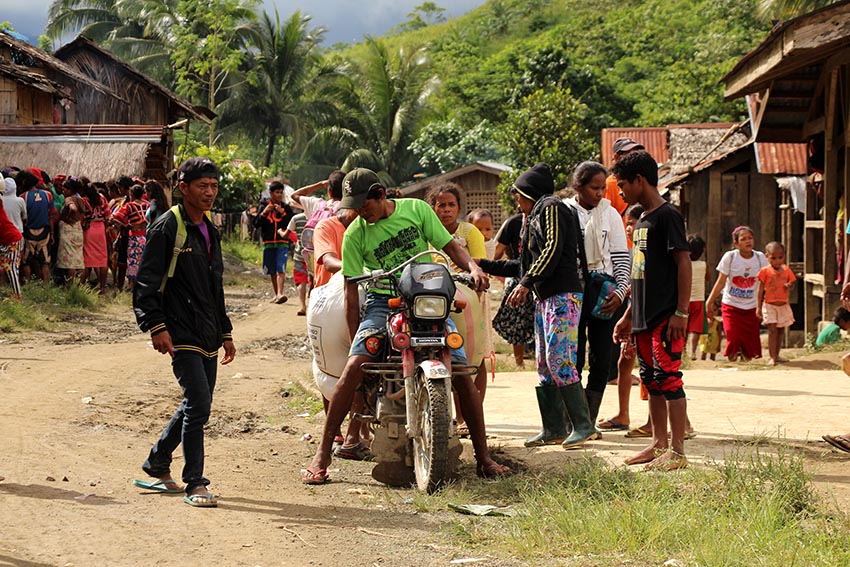
FOR TRANSPORT. A resident prepares to transport sacks of relief goods to his community on Nov. 30, Wednesday. The relief goods were distributed by the Solidarity Action Group for Indigenous Peoples and Peasants and the Department of Social Welfare and Development. (Paulo C. Rizal/davaotoday.com)
Lumad leaders also said their community schools suffer from military attacks.
Committee head for Education Datu Benito Bay-ao said the continuing presence of the military in their communities hamper their education.
Community schools under the Salugpongan Ta Tanu Igkanogon Community Learning Center, Incorporated, were branded as rebel schools, said Bay-ao.
Sabel Laquina, the basic education curriculum coordinator of STTICLCI said that for as long as the military and the Alamara are present in the community, their operation and consequently, the education of the Lumad will be at “constant jeopardy.”
On Friday, Nov. 30, the community celebrated the 23rd founding anniversary of the Salugpongan Ta Tanu Igkanogon organization. The celebration highlighted their successes in defending their right to self-determination and ancestral domain.
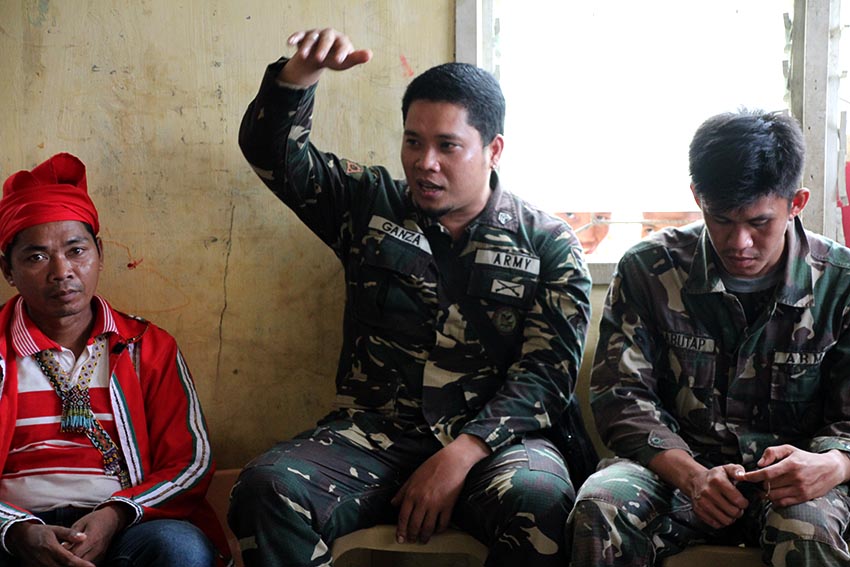
NEW GUY. Cpl. Rico Ganza of the 60th Infantry Battalion says he cannot answer for the alleged crimes committed by the army to the Lumad of Talaingod because he has been assigned to the area for less than a month. Ganza talked with Lumad leaders in a dialogue on Nov. 30, Wednesday. (Paulo C. Rizal/davaotoday.com)

LISTENING. A Manobo Datu smokes while listening to a dialogue between the leaders of the Salugpongan Ta Tanu Igkanogon and Army official Cpl. Rico Ganza from the 60th Infantry Battalion. (Paulo C. Rizal/davaotoday.com)
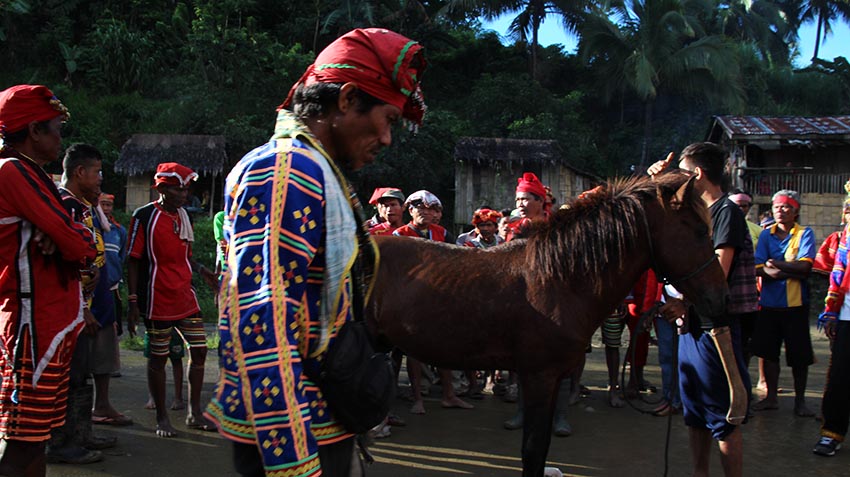
ANNIVERSARY RITUAL. Tribal leaders of the Salugpongan Ta Tanu Igkanogon conduct a ritual symbolizing the continued resistance of the Salugpongan in defense of their right to self determination and ancestral domain to celebrate the 23rd anniversary of their organization. For the anniversary, the Datus sacrificed a chicken and a horse, which were later cooked and shared by the community. (Paulo C. Rizal/davaotoday.com)
The Salugpongan Ta Tanu Igkanogon was established by Datu Guibang Apoga in 1994 to resist the encroachment of big logging company C. Alcantara and Sons in the Lumad communities of Talaingod. Led by Datu Guibang, the Datus of Salugpongan declared a pangayaw (tribal war) against Alsons, killing and injuring their security guards. Datu Guibang has been in hiding ever since, but the remaining Datus of Salugpongan remain resolute in their fight for the rights of the Lumad.
“Atong dugang iduso ang pagbarug sa tawhanong katungod alang sa tinuod nga kaugalingong paghukom ug ipadayon ang diwang masuklanon” (Let us continue to stand for our right to self determination, and maintain the spirit of the struggle), the Salugpongan said in a statement. (davaotoday.com)










